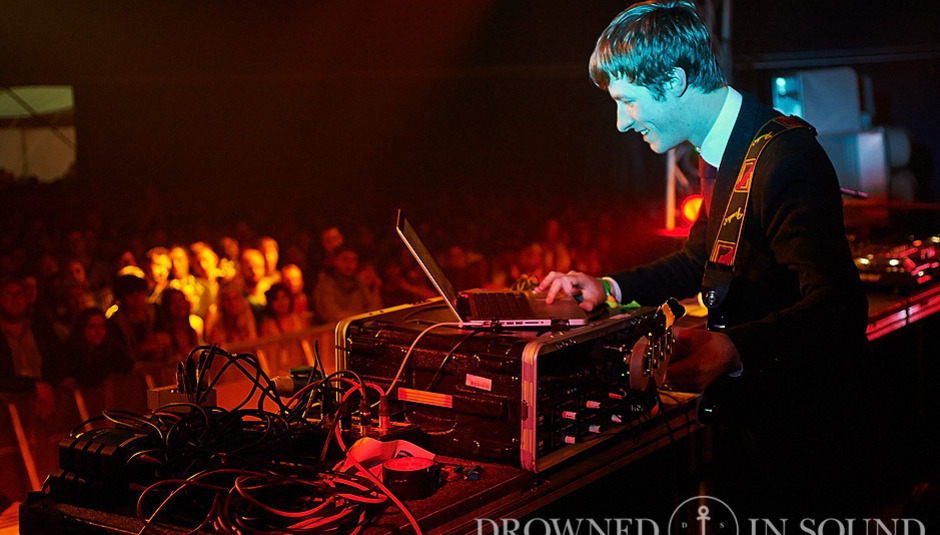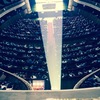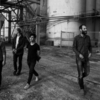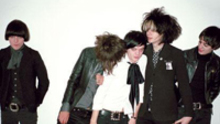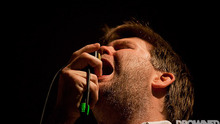Ahead of this year's Mercury prize, DiS in partnership with Naim Audio's new wireless music system, mu-so, will help you GoDeeper into 2014's nominated albums. Today, we would like to turn your attention to East India Youth, who has made the journey from 13 year old making electronica in his Southampton bedroom to the festival tent filling, Mercury nominated artist who needs to decide which song to play in his three and a half minutes on national TV.
We asked EIY fan Derek Robertson to catch up with William Doyle to chat about his journey so far, how he's handling the nomination and his fantastic debut album Total Strife Forever (which DiS' Tom Fenwick awarded 9/10 on DiS back in January!).
Visit our Mercury mini-site for more coverage of all of this year's nominees.
It’s Wednesday the 11th September 2013. The Mercury Music Prize nominations have just been announced – Bowie and the Arctic Monkeys are the early favourites, and there's surprise and bafflement that guitar music, particularly that of Jake Bugg, features so prominently – but William Doyle is not paying attention. Instead, he’s hard at work planning the campaign for debut album Total Strife Forever, and storyboarding the video for lead single, ‘Looking For Someone’. “The wheels were just starting to get into motion,” he tells me. “It was quite exciting really, that period.”
The video, in which he ascends and descends London’s Heron Tower, the camera tightly framing his face, and the song itself, encapsulate everything that makes TSF such an arresting listen. Deeply personal, the music sounds like it’s come into being through its own sheer will, forcing itself to the front of Doyle’s consciousness, and lays bare a man wrestling with the disappointment and heartache that life routinely throws at us. “Looking for someone / I don’t know who they are” he laments, before optimistically adding “Hope they aren’t very far”. Even the album cover itself, a stark, rough portrait of Doyle staring forlornly to the viewers right, leaves you in no doubt as to the turmoil that provided inspiration.
But where other artists slip into maudlin sentimentality, there’s a defiance about Doyle’s writing, and an assuredness about his fuzzed-out techno and crisp electronica. On ‘Dripping Down Your Soul’, earnest pleas burst into multi-coloured euphoria while the album’s centrepiece, ‘Heaven How Long’, is a glorious, choral number that as majestic as it is uplifting. Now, four years after starting work on what would become one of 2014’s most acclaimed albums, and one year on from “not giving a shit to be honest” about the announcement from Covent Garden’s Hospital Club, he stands as one of the 12 nominees, on the cusp of much wider, and well deserved, recognition. With a new album recorded and big plans for 2015, it looks like he’ll be leaving at least some of that strife behind.
DiS: After the Hostel EP came out, could you possibly have imagined the 12 months that’ve followed?
William Doyle: No! It’s been insane, absolutely mental. I feel like a different person, maybe a better one in some ways. A more confident person, perhaps. I couldn’t have banked on anything happening in such a short space of time, as twelve months isn’t very long. I mean, a year is a particularly long period, but I’ve managed to cram so much into that.
When you’re busy touring and playing at festivals, are you aware of things blowing up as big as they have? Or are you isolated from it and don’t really see it going on?
Yeah, I’m aware of it. I’m fairly active online – I ‘m always on Twitter and whatever – and because of that, your perception of these things is happening right in front of you, and it’s pretty accurate. It’s just happening very close to you and it tends to happen online more than anywhere really, so I am totally aware of those things. Maybe that’s not such a bad thing, but sometimes I could probably do with taking a bit less notice. It can be daunting, and makes one feel quite anxious at times.
Did you notice the gigs steadily getting bigger and bigger, and the crowds being more engaged?
One place I noticed that happening was during festival season this year. At the start of it, I was hoping I’d get a fairly big crowd at Field Day and I did, so that was a good way to kick things off. After that it was just watching the crowds grow, kind of as if there was some sort of festival season rumour mill. A lot of people go to festivals now I suppose, and I watched one set not just become bigger in crowd size, but people being more involved and familiar with the material. It all culminated, towards the end, with my last set at Green Man. I was headlining the Garden Stage – it’s a beautiful area to play in – and I was met with this really great crowd; the whole area was really full and the energy and recognition was there. It was the best festival experience I’ve had this year.
Congratulations on the Mercury Music Prize Nomination. Does it feel intense being nominated?
Yeah! It’s something I mentioned after the announcement. I started making Total Strife Forever four years ago, which is a long time to hang on to things, and it only came out this year. And as such, I felt like I didn’t have anything going for me then. I didn’t really know who East India Youth was, it was just this grand master plan that sort of came together before the end of it [being released]. I remember recording a lot of the stuff in my bedroom in Southampton at the time, and my bedroom in Ruislip for the year that I lived there in North London, then finishing off the first mix of it in Southampton again in a flat where the walls were quite thin and the downstairs neighbours could actually hear, so I couldn’t have it up very loud. I had to stand against the back wall to hear frequencies reflecting off it, so it was sort of ramshackle, and it wasn’t really ideal for anyone. Imagine finishing the first mix of the album in that context to bringing it on stage at the Mercury’s – it’s fucking mental.
I feel like it shouldn’t have left that bedroom space…but I’m glad it has. I find it hard to disassociate my experience making it in that place to bringing it to a public stage I suppose; that will always be really weird. That will always be the strangest thing about this whole Mercury nomination. But I don’t feel pressured about it though, so that’s a good thing. I feel pretty calm about the whole thing going forwards.
Did you have any inkling that you would be nominated? Do you hear little whispers or get confident nods, like: “Don’t worry!”
In a way. I don’t want to come across as arrogant because I don’t mean it that way, but if you take into account the reviews the album got from the UK press at the start of the year, and you compare that with previous years’ nominees, it seemed like the record was on a similar critical trajectory to other records that got nominated. So, I didn’t think it was insane or out of the question. I did think it would still be mental if it happened, but it didn’t feel totally impossible. I think a lot of my team were quite hopeful for it because it makes their lives easier and their jobs better, so they were like: “Thumbs up! I’m sure you’ll get a nomination”. I still thought maybe, but I didn’t really think it would happen. I don’t make records to win Mercury Awards or prizes, so it wasn’t like a focus of mine. It wasn’t a case of: “What can I do to get nominated for the Mercury?”
I’m surprised it’s been given the recognition in that sphere though, because I always thought of it as a bit more niche, as most of it is instrumental.
It’s impossible to second-guess what they’re going to pick out of the thousands of albums that get released, or even the amount of albums that get reviewed. It’s hard to think back over the last year and work out what’s even eligible.
One of the main criticisms of the prize is that they seem to shun mainstream stuff, which is a weird argument to make because in the mainstream world the focus isn’t on the album. Those types of artist might all release albums, but they aren’t seen as bodies of work from start to finish. So I think your work has to be of a certain type and ilk to be considered for it, and I’m not saying that one thing is better than the other, but that thing where the album is worked on as a whole piece is kind of left field and on the fringes of music. If you take that into account then I guess the pool of how many albums you consider gets smaller.
Have you been fretting about what you are going to play on the night? I was thinking about this; I imagine you want to play ‘Heaven, How Long’ but I reckon you’ve gone for ‘Looking For Someone’.
You’re right! I wanted to play ‘Heaven’ because I feel like it’s the most representative track on the album, and the whole spirit of the record is tied into that one song. However, it’s over six minutes long and the Mercury Prize is on telly so they’ve got quite a tight schedule. I could have played ‘Dripping Down’, which seems like the most obvious pop song, but when I play that live it’s not particularly visually arresting – it’s quite basic in terms of what I’m doing on stage, and the emphasis is mostly on the vocal performance. In ‘Looking for Someone’ I’m playing the bass and it’s far more visually interesting, so we thought that one might be best. Plus we were happy to chop it down by about 45 seconds.
So you’re given a limit?
Yes, three-and-a-half minutes, keep it underneath if you can.
That’s no time at all!
I know! It seems mental. I guess they’ve got to get through twelve acts and it’s on telly, but you’d think they would just make a longer programme, like an hour. Well, maybe it is an hour; I don’t know how long it’s actually on for. I assumed it was half an hour, like they show some of the acts and then do the announcement.
Well, even just cut down some of the celebrity bullshit and put the music to the forefront, which surely is the whole point.
It isn’t long is it? One act plays after the other, they’ve got a two-tiered stage at the Roundhouse. So one act will actually be playing while the other one is setting up below or beneath them, and then a curtain falls on one and rises on another.
I could understand if someone came along and said: “I’ve got this 14 minute, prog rock space odyssey that I’d like to play,” then they might say: “Well, that’s a little bit long.” But three-and-a-half minutes is really short.
I know, I guess if you’ve got to do it, you’ve got to do it.
Have you allowed yourself to entertain the idea of winning, and what that might feel like?
I had a dream about it the other night and it was pretty good. It was like: “Cool, I’ve won £20,000!” There is the whole Mercury curse thing, especially with your debut record. I suppose Speech Debelle is always a classic example that’s brought up at this moment. I think her record had only just come out, then it got nominated within the next month, then she won and that was it, you never heard from her again. She did release a second album but I don’t think it sold particularly well, which is weird because I don’t feel like that was because the quality of her stuff was bad; I guess the timing maybe wasn’t right.
In a way, I can see the pros and cons of it and anyway, it’s not my decision – I just have to roll with it, however it goes. If I win I probably won’t do anything mental with the money; I won’t build a home studio or anything, I’ll probably just use it to make my touring life more comfortable for me and my crew. It would be useful in terms of making the whole next phase go more smoothly. I’ve pretty much finished the next album anyway, so I wouldn’t feel any artistic pressure from the prize if I won. The next stage is already set in stone.
Do you feel like that’s an advantage having your new material in the bag already? Regardless of when the next album comes out, on the front cover it’s going to say: ‘Mercury Music Award Nominee’ or ‘Mercury Music Award Winner’. A lot of people would feel under pressure having to sit down and write music after that and would think “Oh shit! Everyone’s watching, now I have to come up with something really good” and just tie themselves up in knots.
I finished the tracking of it the week before the announcement, and as such it looks like I’m going to have the mix finished before the ceremony. It’s going to be a fairly different process to the first one; that’s just because I spent so long between finishing the first mix of TSF and it coming out officially, so I had all that time to write new material. I’ve been putting this together since January and now it’s here. I’ve been working on it for about 2 years, and it’s quite fortuitous timing; it makes you feel really good about everything and I feel quite confident that it’s the right thing. It’s going to make the whole next part of the process easier and you’re right in saying that if I had got nominated and hadn’t even started on the next album, I’d be having a nervous breakdown. It would’ve probably taken me another three or four years to finish it, you know?
Total Strife Forever was very intensely personal, from a lot of the lyrics to the painting on the cover; it’s quite deep emotionally. When you were recording new material were you wary about doing the same again and making it such a personal artistic statement? Or did you actively decide “I’m not going to do that this time?”
There is no way that I could be in a similar position to where I was when I wrote TSF, either emotionally or personally. I just wanted whatever I was working on now to reflect where my life has gone in the last couple of years, between finishing TSF and bringing it out. It’s hard to describe…everything I do has always been and always will be fairly personal, especially under East India Youth anyway. It’s always going to have that closeness, that raw element. But now, I feel I’m more confident, and a happier person than I was when I wrote TSF, so hopefully that will come out in someway on this next record.
One of the most impressive things for me about TSF was the way that it blended so many different influences, and there was so many songs that were really quite different, yet the whole thing felt very singular and very whole when you listen to it. Was because it was worked on for such a long period of time?
Yeah! A lot of that stuff from that period of time came into my world view, stuff that I hadn’t heard before and ended up influencing the record. I wasn’t too bothered about following my instincts on those things. I don’t know…events like seeing Factory Floor for the first time and things like that, music that shifted my perspective on what I was doing creatively. I wasn’t scared about incorporating those new things wherever possible.
Because there’s a lot of motion in it, there are a lot of different things going on in it, but the key to having the listeners accept how much changes and shifts between one thing and another is to put it in order. The sequencing of the record was really important, and the specific bits in between the tracks and how long before the next track comes in, that was a really big consideration. So I think that if it works, that’s why, because I spent a lot of time considering how to make it flow in a certain way, despite how disparate a lot of the inferences were.
Now that you’ve worked on the follow up material in a much shorter space of time, is the range narrowed down on the new material? Is it such a disparate spread of stuff or have you focused more on one particular direction, one particular style?
I thought that I was going to hone in on one aspect of my sound and really explore that, but I haven’t.
What was the sound you were thinking of honing in on?
Oh, I had loads of different ideas. I could have made a dance record, I could have made an instrumental record, or I could have made a completely…more of a pop record or something. I determined to hone in on a particular aspect of my sound and work on it because I felt, like: “Should I just be laying my cards on the table and going down a more specific route?” But, what actually happened is that I felt unable to do that. I’ve been making music on the computer since I was about 13, and I realised that every track I’ve made has been different to the one before it, and that’s always been the way I’ve worked - why would that change now? So even though I tried to hone in on particular aspects of my sound, I ended up with a potentially even more bat shit mixture of stuff.
I’ve been thinking about this a lot and I try to think about these things – “Why is that the case? Why have I done that?” Most of my teenage years were spent listening to music through the Internet, and music is completely fragmented now – you can go back as far as you like in history and listen to things. The amount of genres, or scenes, or styles, is a lot wider than it was fifteen or twenty years ago, so my formative years have been based on this fragmented space of the Internet and I think that’s reflected in my work.
I’ve seen you live several times now, and one of the interesting things that you do is the way you let various songs bleed into one another, and how it then becomes more of a journey rather than playing this song and then applause, and then that song and then that song. It’s not something that you generally see. Have you taken any of that, and any of your live experiences, into the recording of the new material or into the way you’ve approached putting the album together?
Yeah, definitely, it is so important to me that those things are correct. I guess more so for a live experience than for an album, because I suppose people are more conditioned to listening to one song after the other and not necessarily listening to a bleed or a crossover when listening to a record. Live, especially with electronic music, you kind of expect it to flow like a DJ set. Not in terms of the writing and composition of the tracks – you still deal with songs on a singular basis – but even before I’d finished dealing with the vocals I knew what the order of the tracks was going to be. For example, I knew that finishing them off, one by one, I’d know they’d be impacting on, or impacted by, what’s come before or after. Track by track, I think it’s really important to have that perspective on the whole thing as a whole piece of work in itself, not just these little elements. They work together to make one thing.
I’ve laboured over the track listing on this one, and I think it’s working. I think live as well, it is important to do that, getting people to accept how many different modes and phases you take them through, especially if they are strangers to the music. There needs to be some kind of level of consistence there; the way I do it is that I don’t give anyone a chance to clap really. I’m just moving between one feeling and the next and, if they don’t like it, then they can walk away. But, if they do get it, they’re kind of captivated, they can’t move and they are wondering what’s going to come next. That’s the whole basis I’m operating on. I find that quite exciting watching other people, as I’m trying to do that myself.
As a solo electronic artist, and as you get bigger and more successful, do you ever think: “In order to do the sound that I want to do, or to make the show the way I want, I might need to have a few more people playing with me”?
Yeah it is. It’s something that I’ve thought about and something I realised I can’t afford yet; my fees would have to quadruple to accommodate that sort of thing. It’s just a totally economic concern really, but I would like to do that at some point. However, starting in January, I’ve completely gutted my live setup and I’ve completely redesigned the way it looks on stage. I won’t say too much but I’ve gotten rid of the table. That stands between me and the audience and creates this kind of disconnect. When I started playing live, I felt pretty confident with the whole thing because it was a kind of barrier, but now I wish it wasn’t there. It makes you feel constricted, so I’ve completely struck the table from the live setup. From January onwards I’ll be playing with a few more bits of gear and it’ll look different, a bit more physical. That’ll keep the live shows interesting and involving, and if I’m able to get some musicians to come in and help me play stuff, then great; it’s not something that is necessarily going to happen immediately, but I do see it in the next two or three years.
I imagine it’s quite hard though to tread the line between the two extremes, between being an electronic musician but wanting to put on a proper show.
Yeah, that’s what I’ve been really conscious about the whole time, touring this record. I haven’t got a lot on stage but it’s not about doing a lot, it’s about the gear, it’s about my interaction with the limited things I’ve got. I’m not really a gear geek, and I’m not really a very technical person production wise, so everything is done more on instinct rather than convention – I don’t always explore the technical avenues that I can take. I’ve got a couple of synth’s and I’ve got this innovation base station too, which I really like, and I’ve been using a Korg MS20 in places but nothing serious. A lot of people always ask me what I use on stage afterwards and I get really bored of that conversation, it’s just some software – It’s just not that interesting! They want to know what synth’s I’m using and my effects, but it’s just not my focus. Because I have that attitude, it makes it slightly easier to tread that line between the two extremes, between making it look good and not making it look like some sort of gadget exhibition.
Total Strife Forever is out now.

